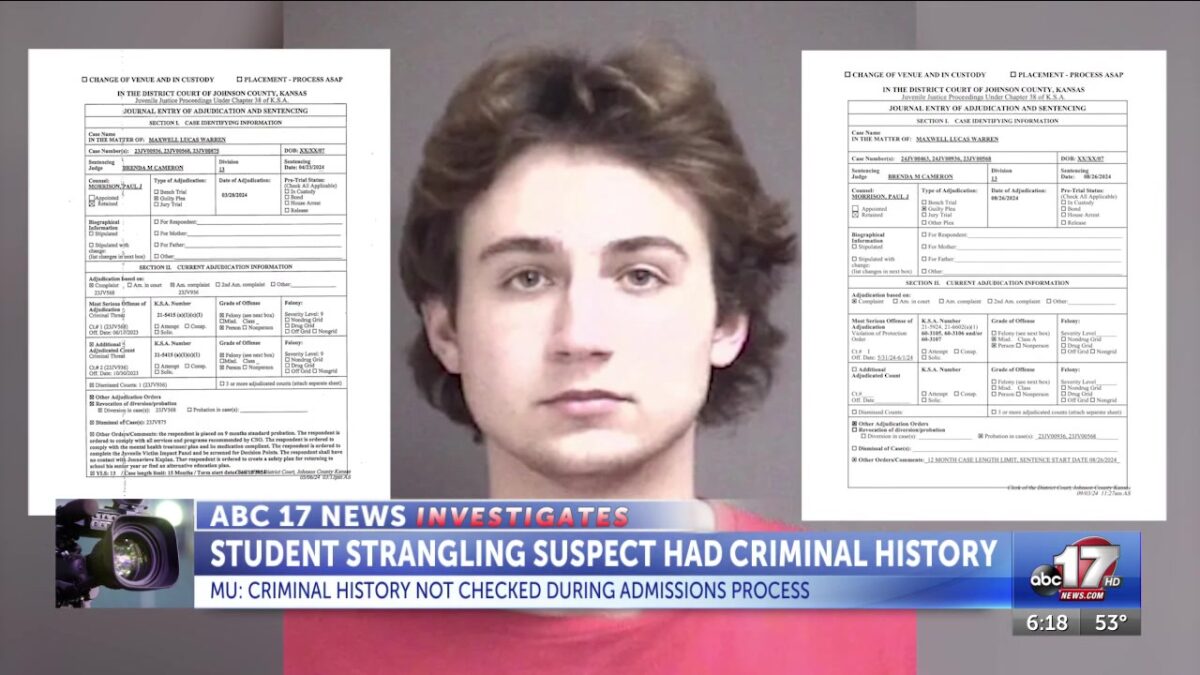University of Missouri strangling suspect had criminal history before coming to Columbia

Haley Swaino
COLUMBIA, Mo. (KMIZ)
A University of Missouri student recently accused of strangling another person at a residence hall after being blocked on a social media app had a history of crimes against other people, according to Kansas court records.
Maxwell Warren, 18, was charged Nov. 3 with first-degree burglary, second-degree domestic assault, first-degree domestic assault and misdemeanor fourth-degree assault on allegations that he strangled another person in a residence hall after the victim blocked him on Snapchat.
It’s not the first time Warren has been in the criminal justice system.
Sentencing documents from previous cases in Kansas show Warren had a criminal record before the MU choking allegations.
Warren pleaded guilty in April 2024 to being a criminal threat, a felony. He was sentenced to nine months’ probation and ordered to comply with a mental health treatment plan. He also had to complete a juvenile victim impact panel, a program where young offenders hear personal stories from victims of crime to help understand the consequences of their actions.
On top of $1,000 in restitution, Warren was barred from having contact with the victim in that case.
He pleaded guilty in August 2024 to violating a protection order and was sentenced to six months of probation.
MU does not check criminal history during the admissions process, a spokesman wrote in an email. Spokesman Christopher Ave wrote that MU received 27,000 admission applications for fall 2025, and many states close juvenile criminal records to the public.
Warren’s attorney, Andrew Popplewell, deferred questions to MU.
“I am not licensed to practice law in Kansas,” Popplewell said. “In Missouri, juvenile records are confidential. Even if I knew anything about any Kansas records, I am bound by ethical considerations to not discuss.”
About 70-72% of four-year colleges in the United States require applicants to disclose their criminal history. This percentage varies by institution type. A 2019 study found 81% of U.S. private colleges required such checks, 55% of public colleges and 40% of community colleges.
Columbia College, a private school, asks applicants if they’ve been convicted of any crimes, according to its website.
Applications require a “Yes” or “No” answer to the question: “Have you ever been convicted of a felony or a misdemeanor?” The College says a “Yes” is not an automatic denial of admission, but will initiate a review process.
The MU victim had blocked Warren on the social media application Snapchat on Sept. 26, according to the probable cause statement. Warren went to the victim’s residence hall to confront the victim the same day. When the victim cracked open the door, Warren forced his way into their dorm room, the statement says.
He then allegedly strangled the victim while demanding that they add him back on Snapchat immediately. The victim unblocked Warren after the assault, the statement says.
Warren allegedly sent a message to the victim on Instagram acknowledging the assault on Sept. 28 and then threatened to hurt the victim again on Sept. 30, court documents say. Warren then allegedly assaulted the victim in their dorm room again on Oct. 29, the statement says. That time, the victim allegedly lost consciousness after they were strangled.
In a separate probable cause statement, a witness reported seeing Warren assault a woman near the Virginia Avenue garage on MU’s campus. Warren claimed he was assaulted first, but video footage supposedly did not support his claim, the statement says.
Researchers say not many studies have looked at whether screening college applicants for criminal history reduces crime on campus.
Warren is being held at the Boone County Jail without bond, and Ave said he has been banned from MU’s campus.
He appeared for a hearing on Nov. 5 by video from the jail where he waived his arraignment and pleaded not guilty, according to court records. A preliminary hearing is scheduled for 9 a.m. Dec. 9.